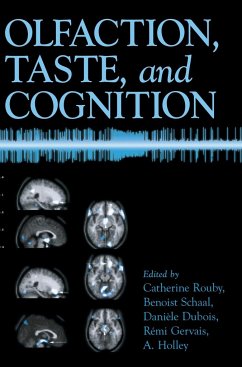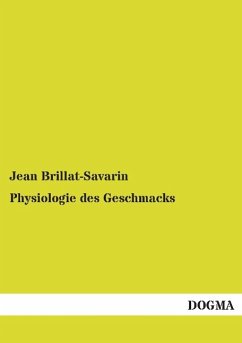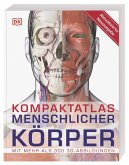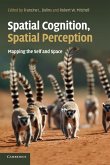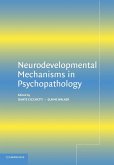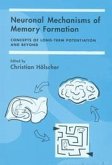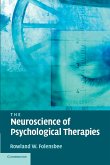Catherine Rouby / Benoist Schaal / Danièle Dubois / Rémi Gervais / A. Holley (eds.)
Olfaction, Taste, and Cognition
Herausgeber: Rouby, Catherine; Dubois, Danièle; Schaal, Benoist
Catherine Rouby / Benoist Schaal / Danièle Dubois / Rémi Gervais / A. Holley (eds.)
Olfaction, Taste, and Cognition
Herausgeber: Rouby, Catherine; Dubois, Danièle; Schaal, Benoist
- Gebundenes Buch
- Merkliste
- Auf die Merkliste
- Bewerten Bewerten
- Teilen
- Produkt teilen
- Produkterinnerung
- Produkterinnerung
This book examines olfactory and gustatory cognition, including chapters on odor memory, genetic variation in taste, and the hedonistic dimensions of odors.
Andere Kunden interessierten sich auch für
![Physiologie des Geschmacks Physiologie des Geschmacks]() Jean Brillat-SavarinPhysiologie des Geschmacks44,90 €
Jean Brillat-SavarinPhysiologie des Geschmacks44,90 €![Kompaktatlas menschlicher Körper Kompaktatlas menschlicher Körper]() Steve ParkerKompaktatlas menschlicher Körper12,95 €
Steve ParkerKompaktatlas menschlicher Körper12,95 €![Spatial Cognition, Spatial Perception Spatial Cognition, Spatial Perception]() Spatial Cognition, Spatial Perception115,99 €
Spatial Cognition, Spatial Perception115,99 €![Neurodevelopmental Mechanisms in Psychopathology Neurodevelopmental Mechanisms in Psychopathology]() Dante Cicchetti / Elaine F. Walker (eds.)Neurodevelopmental Mechanisms in Psychopathology62,99 €
Dante Cicchetti / Elaine F. Walker (eds.)Neurodevelopmental Mechanisms in Psychopathology62,99 €![Neuronal Mechanisms of Memory Formation Neuronal Mechanisms of Memory Formation]() Christian Hölscher (ed.)Neuronal Mechanisms of Memory Formation119,99 €
Christian Hölscher (ed.)Neuronal Mechanisms of Memory Formation119,99 €![The Neuroscience of Psychological Therapies The Neuroscience of Psychological Therapies]() Rowland W. FolensbeeThe Neuroscience of Psychological Therapies65,99 €
Rowland W. FolensbeeThe Neuroscience of Psychological Therapies65,99 €![Latent Inhibition Latent Inhibition]() Latent Inhibition152,99 €
Latent Inhibition152,99 €-
-
-
This book examines olfactory and gustatory cognition, including chapters on odor memory, genetic variation in taste, and the hedonistic dimensions of odors.
Hinweis: Dieser Artikel kann nur an eine deutsche Lieferadresse ausgeliefert werden.
Hinweis: Dieser Artikel kann nur an eine deutsche Lieferadresse ausgeliefert werden.
Produktdetails
- Produktdetails
- Verlag: Cambridge University Press
- Seitenzahl: 486
- Erscheinungstermin: 23. Januar 2015
- Englisch
- Abmessung: 250mm x 175mm x 31mm
- Gewicht: 1010g
- ISBN-13: 9780521790581
- ISBN-10: 0521790581
- Artikelnr.: 29339350
- Herstellerkennzeichnung
- Libri GmbH
- Europaallee 1
- 36244 Bad Hersfeld
- gpsr@libri.de
- Verlag: Cambridge University Press
- Seitenzahl: 486
- Erscheinungstermin: 23. Januar 2015
- Englisch
- Abmessung: 250mm x 175mm x 31mm
- Gewicht: 1010g
- ISBN-13: 9780521790581
- ISBN-10: 0521790581
- Artikelnr.: 29339350
- Herstellerkennzeichnung
- Libri GmbH
- Europaallee 1
- 36244 Bad Hersfeld
- gpsr@libri.de
Foreword; Acknowledgements; A tribute to Edmond Roudnitska; 1. Olfaction
and cognition: a philosophical and psychoanalytical view Annick Le Guérer;
2. Cognitive aspects of olfaction in perfumer practice André Holley; 3. The
specific characteristics of the sense of smell Egon Peter Köster; 4. Names
and categories for odors: the 'veridical label' Danièle Dubois; 5.
Nose-wise: olfactory metaphors in mind David Howes; 6. Linguistic
expressions of odors in French Sophie David; 7. Classification of odors and
structure-odor relationships Maurice Chastrette; 8. The acquisition and
activation of odor hedonics in everyday situations: conditioning and
priming studies Dick Hermans and Frank Baeyens; 9. Is there a hedonic
dimension of odors? Catherine Rouby and Moustafa Bensafi; 10. The influence
of odors on mood and affective cognition Rachel S. Herz; 11. Assessing
putative human pheromones Suma Jacob, Bethanne Zelano, Davinder J. S.
Hayreh and Martha K. McClintock; 12. The neural correlates of emotion
perception: from faces to taste Mary L. Phillips and Maike Heining; 13.
Testing odor memory: incidental vs. intentional learning implicit vs.
explicit memory Sylvie Issanchou, Dominique Valentin, Claire Sulmont,
Joachim Degel and Egon Peter Köster; 14. Odor memory: a memory systems
approach Maria Larsson; 15. Repetition priming in odor memory Mats J.
Olsson, Maria Faxbrink and Fredrik U. Jönsson; 16. Odor memory in
Alzheimer's disease Steven Nordin and Claire Murphy; 17. Development of
odor naming and odor memory from childhood to young adulthood Johannes
Lehrner and Peter Walla; 18. Odor coding at the periphery of the olfactory
system Gilles Sicard; 19. On human brain activity within the first second
after odor presentation Bettina M. Pause; 20. Processing of olfactory
affective information: contribution of functional imaging studies Robert J.
Zatorre; 21. Experience-induced changes reveal functional dissociation
within olfactory pathways Nadine Ravel, Anne-Marie Mouly, Pascal Chabaud
and Rémi Gervais; 22. Increased taste sensitivity by familiarization to
'novel' stimuli Annick Faurion, Barbara Cerf, Anne-Maria Pillias and
Nathalie Boireau; 23. The cortical representation of taste and smell Edmund
T. Rolls; 24. New psychophysical insights in evaluating genetic variation
in taste Katharine Fast, Valerie B. Duffy and Linda M. Bartoshuk; 25. The
individuality of odor perception Robyn Hudson and Hans DisTel; 26.
Olfactory cognition at the start of life: the perinatal shaping of
selective odor responsiveness Benoist Schaal, Robert Soussignan and Luc
Marlier; 27. Age-related changes of chemosensory functions Thomas Hummel,
S. Heilman and Claire Murphy; Index.
and cognition: a philosophical and psychoanalytical view Annick Le Guérer;
2. Cognitive aspects of olfaction in perfumer practice André Holley; 3. The
specific characteristics of the sense of smell Egon Peter Köster; 4. Names
and categories for odors: the 'veridical label' Danièle Dubois; 5.
Nose-wise: olfactory metaphors in mind David Howes; 6. Linguistic
expressions of odors in French Sophie David; 7. Classification of odors and
structure-odor relationships Maurice Chastrette; 8. The acquisition and
activation of odor hedonics in everyday situations: conditioning and
priming studies Dick Hermans and Frank Baeyens; 9. Is there a hedonic
dimension of odors? Catherine Rouby and Moustafa Bensafi; 10. The influence
of odors on mood and affective cognition Rachel S. Herz; 11. Assessing
putative human pheromones Suma Jacob, Bethanne Zelano, Davinder J. S.
Hayreh and Martha K. McClintock; 12. The neural correlates of emotion
perception: from faces to taste Mary L. Phillips and Maike Heining; 13.
Testing odor memory: incidental vs. intentional learning implicit vs.
explicit memory Sylvie Issanchou, Dominique Valentin, Claire Sulmont,
Joachim Degel and Egon Peter Köster; 14. Odor memory: a memory systems
approach Maria Larsson; 15. Repetition priming in odor memory Mats J.
Olsson, Maria Faxbrink and Fredrik U. Jönsson; 16. Odor memory in
Alzheimer's disease Steven Nordin and Claire Murphy; 17. Development of
odor naming and odor memory from childhood to young adulthood Johannes
Lehrner and Peter Walla; 18. Odor coding at the periphery of the olfactory
system Gilles Sicard; 19. On human brain activity within the first second
after odor presentation Bettina M. Pause; 20. Processing of olfactory
affective information: contribution of functional imaging studies Robert J.
Zatorre; 21. Experience-induced changes reveal functional dissociation
within olfactory pathways Nadine Ravel, Anne-Marie Mouly, Pascal Chabaud
and Rémi Gervais; 22. Increased taste sensitivity by familiarization to
'novel' stimuli Annick Faurion, Barbara Cerf, Anne-Maria Pillias and
Nathalie Boireau; 23. The cortical representation of taste and smell Edmund
T. Rolls; 24. New psychophysical insights in evaluating genetic variation
in taste Katharine Fast, Valerie B. Duffy and Linda M. Bartoshuk; 25. The
individuality of odor perception Robyn Hudson and Hans DisTel; 26.
Olfactory cognition at the start of life: the perinatal shaping of
selective odor responsiveness Benoist Schaal, Robert Soussignan and Luc
Marlier; 27. Age-related changes of chemosensory functions Thomas Hummel,
S. Heilman and Claire Murphy; Index.
Foreword; Acknowledgements; A tribute to Edmond Roudnitska; 1. Olfaction and cognition: a philosophical and psychoanalytical view Annick Le Guérer; 2. Cognitive aspects of olfaction in perfumer practice André Holley; 3. The specific characteristics of the sense of smell Egon Peter Köster; 4. Names and categories for odors: the 'veridical label' Danièle Dubois; 5. Nose-wise: olfactory metaphors in mind David Howes; 6. Linguistic expressions of odors in French Sophie David; 7. Classification of odors and structure-odor relationships Maurice Chastrette; 8. The acquisition and activation of odor hedonics in everyday situations: conditioning and priming studies Dick Hermans and Frank Baeyens; 9. Is there a hedonic dimension of odors? Catherine Rouby and Moustafa Bensafi; 10. The influence of odors on mood and affective cognition Rachel S. Herz; 11. Assessing putative human pheromones Suma Jacob, Bethanne Zelano, Davinder J. S. Hayreh and Martha K. McClintock; 12. The neural correlates of emotion perception: from faces to taste Mary L. Phillips and Maike Heining; 13. Testing odor memory: incidental vs. intentional learning implicit vs. explicit memory Sylvie Issanchou, Dominique Valentin, Claire Sulmont, Joachim Degel and Egon Peter Köster; 14. Odor memory: a memory systems approach Maria Larsson; 15. Repetition priming in odor memory Mats J. Olsson, Maria Faxbrink and Fredrik U. Jönsson; 16. Odor memory in Alzheimer's disease Steven Nordin and Claire Murphy; 17. Development of odor naming and odor memory from childhood to young adulthood Johannes Lehrner and Peter Walla; 18. Odor coding at the periphery of the olfactory system Gilles Sicard; 19. On human brain activity within the first second after odor presentation Bettina M. Pause; 20. Processing of olfactory affective information: contribution of functional imaging studies Robert J. Zatorre; 21. Experience-induced changes reveal functional dissociation within olfactory pathways Nadine Ravel, Anne-Marie Mouly, Pascal Chabaud and Rémi Gervais; 22. Increased taste sensitivity by familiarization to 'novel' stimuli Annick Faurion, Barbara Cerf, Anne-Maria Pillias and Nathalie Boireau; 23. The cortical representation of taste and smell Edmund T. Rolls; 24. New psychophysical insights in evaluating genetic variation in taste Katharine Fast, Valerie B. Duffy and Linda M. Bartoshuk; 25. The individuality of odor perception Robyn Hudson and Hans DisTel; 26. Olfactory cognition at the start of life: the perinatal shaping of selective odor responsiveness Benoist Schaal, Robert Soussignan and Luc Marlier; 27. Age-related changes of chemosensory functions Thomas Hummel, S. Heilman and Claire Murphy; Index.
Foreword; Acknowledgements; A tribute to Edmond Roudnitska; 1. Olfaction
and cognition: a philosophical and psychoanalytical view Annick Le Guérer;
2. Cognitive aspects of olfaction in perfumer practice André Holley; 3. The
specific characteristics of the sense of smell Egon Peter Köster; 4. Names
and categories for odors: the 'veridical label' Danièle Dubois; 5.
Nose-wise: olfactory metaphors in mind David Howes; 6. Linguistic
expressions of odors in French Sophie David; 7. Classification of odors and
structure-odor relationships Maurice Chastrette; 8. The acquisition and
activation of odor hedonics in everyday situations: conditioning and
priming studies Dick Hermans and Frank Baeyens; 9. Is there a hedonic
dimension of odors? Catherine Rouby and Moustafa Bensafi; 10. The influence
of odors on mood and affective cognition Rachel S. Herz; 11. Assessing
putative human pheromones Suma Jacob, Bethanne Zelano, Davinder J. S.
Hayreh and Martha K. McClintock; 12. The neural correlates of emotion
perception: from faces to taste Mary L. Phillips and Maike Heining; 13.
Testing odor memory: incidental vs. intentional learning implicit vs.
explicit memory Sylvie Issanchou, Dominique Valentin, Claire Sulmont,
Joachim Degel and Egon Peter Köster; 14. Odor memory: a memory systems
approach Maria Larsson; 15. Repetition priming in odor memory Mats J.
Olsson, Maria Faxbrink and Fredrik U. Jönsson; 16. Odor memory in
Alzheimer's disease Steven Nordin and Claire Murphy; 17. Development of
odor naming and odor memory from childhood to young adulthood Johannes
Lehrner and Peter Walla; 18. Odor coding at the periphery of the olfactory
system Gilles Sicard; 19. On human brain activity within the first second
after odor presentation Bettina M. Pause; 20. Processing of olfactory
affective information: contribution of functional imaging studies Robert J.
Zatorre; 21. Experience-induced changes reveal functional dissociation
within olfactory pathways Nadine Ravel, Anne-Marie Mouly, Pascal Chabaud
and Rémi Gervais; 22. Increased taste sensitivity by familiarization to
'novel' stimuli Annick Faurion, Barbara Cerf, Anne-Maria Pillias and
Nathalie Boireau; 23. The cortical representation of taste and smell Edmund
T. Rolls; 24. New psychophysical insights in evaluating genetic variation
in taste Katharine Fast, Valerie B. Duffy and Linda M. Bartoshuk; 25. The
individuality of odor perception Robyn Hudson and Hans DisTel; 26.
Olfactory cognition at the start of life: the perinatal shaping of
selective odor responsiveness Benoist Schaal, Robert Soussignan and Luc
Marlier; 27. Age-related changes of chemosensory functions Thomas Hummel,
S. Heilman and Claire Murphy; Index.
and cognition: a philosophical and psychoanalytical view Annick Le Guérer;
2. Cognitive aspects of olfaction in perfumer practice André Holley; 3. The
specific characteristics of the sense of smell Egon Peter Köster; 4. Names
and categories for odors: the 'veridical label' Danièle Dubois; 5.
Nose-wise: olfactory metaphors in mind David Howes; 6. Linguistic
expressions of odors in French Sophie David; 7. Classification of odors and
structure-odor relationships Maurice Chastrette; 8. The acquisition and
activation of odor hedonics in everyday situations: conditioning and
priming studies Dick Hermans and Frank Baeyens; 9. Is there a hedonic
dimension of odors? Catherine Rouby and Moustafa Bensafi; 10. The influence
of odors on mood and affective cognition Rachel S. Herz; 11. Assessing
putative human pheromones Suma Jacob, Bethanne Zelano, Davinder J. S.
Hayreh and Martha K. McClintock; 12. The neural correlates of emotion
perception: from faces to taste Mary L. Phillips and Maike Heining; 13.
Testing odor memory: incidental vs. intentional learning implicit vs.
explicit memory Sylvie Issanchou, Dominique Valentin, Claire Sulmont,
Joachim Degel and Egon Peter Köster; 14. Odor memory: a memory systems
approach Maria Larsson; 15. Repetition priming in odor memory Mats J.
Olsson, Maria Faxbrink and Fredrik U. Jönsson; 16. Odor memory in
Alzheimer's disease Steven Nordin and Claire Murphy; 17. Development of
odor naming and odor memory from childhood to young adulthood Johannes
Lehrner and Peter Walla; 18. Odor coding at the periphery of the olfactory
system Gilles Sicard; 19. On human brain activity within the first second
after odor presentation Bettina M. Pause; 20. Processing of olfactory
affective information: contribution of functional imaging studies Robert J.
Zatorre; 21. Experience-induced changes reveal functional dissociation
within olfactory pathways Nadine Ravel, Anne-Marie Mouly, Pascal Chabaud
and Rémi Gervais; 22. Increased taste sensitivity by familiarization to
'novel' stimuli Annick Faurion, Barbara Cerf, Anne-Maria Pillias and
Nathalie Boireau; 23. The cortical representation of taste and smell Edmund
T. Rolls; 24. New psychophysical insights in evaluating genetic variation
in taste Katharine Fast, Valerie B. Duffy and Linda M. Bartoshuk; 25. The
individuality of odor perception Robyn Hudson and Hans DisTel; 26.
Olfactory cognition at the start of life: the perinatal shaping of
selective odor responsiveness Benoist Schaal, Robert Soussignan and Luc
Marlier; 27. Age-related changes of chemosensory functions Thomas Hummel,
S. Heilman and Claire Murphy; Index.
Foreword; Acknowledgements; A tribute to Edmond Roudnitska; 1. Olfaction and cognition: a philosophical and psychoanalytical view Annick Le Guérer; 2. Cognitive aspects of olfaction in perfumer practice André Holley; 3. The specific characteristics of the sense of smell Egon Peter Köster; 4. Names and categories for odors: the 'veridical label' Danièle Dubois; 5. Nose-wise: olfactory metaphors in mind David Howes; 6. Linguistic expressions of odors in French Sophie David; 7. Classification of odors and structure-odor relationships Maurice Chastrette; 8. The acquisition and activation of odor hedonics in everyday situations: conditioning and priming studies Dick Hermans and Frank Baeyens; 9. Is there a hedonic dimension of odors? Catherine Rouby and Moustafa Bensafi; 10. The influence of odors on mood and affective cognition Rachel S. Herz; 11. Assessing putative human pheromones Suma Jacob, Bethanne Zelano, Davinder J. S. Hayreh and Martha K. McClintock; 12. The neural correlates of emotion perception: from faces to taste Mary L. Phillips and Maike Heining; 13. Testing odor memory: incidental vs. intentional learning implicit vs. explicit memory Sylvie Issanchou, Dominique Valentin, Claire Sulmont, Joachim Degel and Egon Peter Köster; 14. Odor memory: a memory systems approach Maria Larsson; 15. Repetition priming in odor memory Mats J. Olsson, Maria Faxbrink and Fredrik U. Jönsson; 16. Odor memory in Alzheimer's disease Steven Nordin and Claire Murphy; 17. Development of odor naming and odor memory from childhood to young adulthood Johannes Lehrner and Peter Walla; 18. Odor coding at the periphery of the olfactory system Gilles Sicard; 19. On human brain activity within the first second after odor presentation Bettina M. Pause; 20. Processing of olfactory affective information: contribution of functional imaging studies Robert J. Zatorre; 21. Experience-induced changes reveal functional dissociation within olfactory pathways Nadine Ravel, Anne-Marie Mouly, Pascal Chabaud and Rémi Gervais; 22. Increased taste sensitivity by familiarization to 'novel' stimuli Annick Faurion, Barbara Cerf, Anne-Maria Pillias and Nathalie Boireau; 23. The cortical representation of taste and smell Edmund T. Rolls; 24. New psychophysical insights in evaluating genetic variation in taste Katharine Fast, Valerie B. Duffy and Linda M. Bartoshuk; 25. The individuality of odor perception Robyn Hudson and Hans DisTel; 26. Olfactory cognition at the start of life: the perinatal shaping of selective odor responsiveness Benoist Schaal, Robert Soussignan and Luc Marlier; 27. Age-related changes of chemosensory functions Thomas Hummel, S. Heilman and Claire Murphy; Index.

